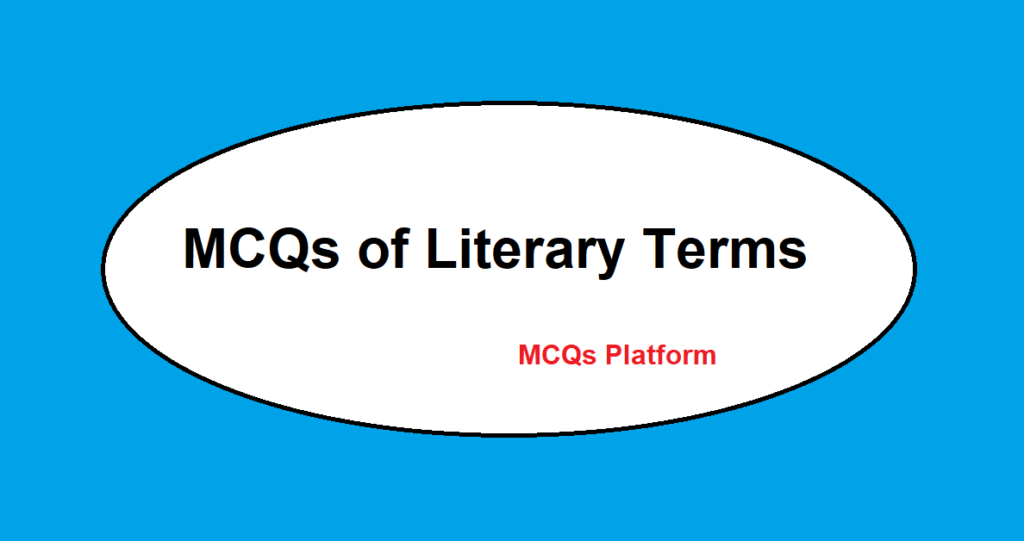MCQs of Literary Terms is an important section of English literature. You can find all mcqs of literary terms. Sudents can qualify their competitive exams if they practice these mcqs atleast three time.
Literary Terms MCQs
1. Sometimes you come across such a group of words or phrases that start with the same sound. You certainly enjoy while pronouncing them. It is an example of…..
a) Detonation
b) Alliteration
c) Allusion
d) Anaphora
2. You become very frank with your friends and you set aside all formalities while talking to them. It means you are using slang or informal language which is called…. in literary terms.
a) Colloquialism
b) Realism
c) Allegory
d) Allusion
3. While you are making a speech and you repeat a word or a phrase time and again at the start of your sentence to assure people of your commitment to your cause. It is an example of….literary term.
a) Epigraph
b) Epistolary
c) Anaphora
d) Hyperbole
4. You certainly want to make your large text very catchy; you start it with a verse, poem, quotation, or song. It means you demonstrate the literary term……
a) Allegory
b) Euphemism
c) Epigraph
d) Flashback
e) Hyperbole
5. Sometimes you describe a scene, idea, or thing that appeals to at least one of five senses of others. It is an example of…….
a) Simile
b) Metaphor
c) Epigraph
d) Imagery
6. When you say something but it has the opposite meaning; it is an example of …..
a) Irony
b) Hyperbole
c) Flashback
d) Simile
7. While you are not in a position to criticize someone’s action directly; you fabricate an animal story in which the same action is performed by the animals and you criticize their action forcefully. It is an example of…..
a) Metaphor
b) Epigraph
c) Allegory
d) Imagery
8. Sometimes it so happens that you cannot convey bad news in harsh words directly; you convey that news in polite words; it is the example of ……
a) Hyperbole
b) Euphemism
c) Irony
d) Simile
9. In movies and plays especially it so happens that a present scene is interrupted by a past scene for a short period that proves to be very supportive to understand the current situation. It is an example of …
a) Allegory
b) Metaphor
c) Flashback
d) Alliteration
10. You speak sometimes such sentences that cannot be possible literary but they add to the importance of the main idea you are conveying to someone.
a) Foreshadowing
b) Hyperbole
c) Metaphor
d) Epigraph
11. To make your story more catchy and interesting you start comparing or contrasting two ideas with each other. it is an example of ….
a) Juxtaposition
b) Euphemism
c) Alliteration
d) Allegory
12. You compare someone’s good or bad quality with a standard thing or living being; you use the word “as” or “like”; for example, you say he is as tall as a tower, etc.
a) Metaphor
b) Simile
c) Allegory
d) Hyperbole
13. Sometimes you get very emotional and you don’t compare someone’s qualities with a standard thing or living being; instead, you call someone the same living being direct. For example, you say my friend is a tiger. You mean to say; your friend is brave.
a) Simile
b) Hyperbole
c) Juxtaposition
d) Metaphor
14. A writer expects a particular feeling from an audience; such feelings are aroused by the dialogues or scenes. In literary terms; it is called….
a) Mood
b) Feeling
c) Realization
d) Reality
15. The writers sometimes use compound words; one of the two expresses contrdictory meaning ; for example, deafening silence, etc.
a) Contradiction
b) Oxymoron
c) Paradox
d) Juxtaposition
16. No doubt, the poets have to deep observation; they look deep into the things that cannot be done by a common man. Sometimes, a poet says that he sees beauty’s feet dancing here and there; the poet associate feet to beauty; in literary term it is…
a) Hyperbole
b) Simile
c) Allegory
d) personification
17. Especially in poetry, sometimes it so happens that a poet wants to emphasize a thing forcefully; he pronounces a particular word or phrase over and over again. It is an example of …..
a) Flashback
b) Epigraph
c) Repetition
d) Mood
18. A person sometimes cannot criticize someone directly; to avoid any quarreling situation he criticizes someone through parody, comic acts, or jokes. It is the example of ……
a) Satire
b) Criticism
c) Hatred
d) Mood
19. Especially, in dramas sometimes a person speaks to himself aloud when there is nobody all around. It is called ……
a) Dialogue
b) Soliloquy
c) Self-absorption
d) Self-deception
20. The writers use figures, words, events, and situations to add to the importance of the main idea. This is called ……
a) Reference
b) Ideal
c) Symbolism
d) Realism

